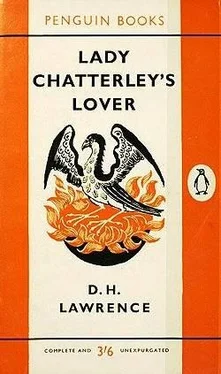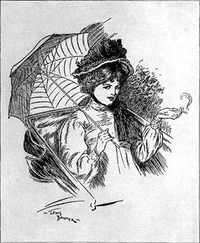Ah, how sad that man first prostitutes woman, then woman prostitutes man. Giovanni was pining to prostitute himself, dribbling like a dog, wanting to give himself to a woman. And for money!
Connie looked at Venice far off, low and rose-coloured upon the water. Built of money, blossomed of money, and dead with money. The money-deadness! Money, money, money, prostitution and deadness.
Yet Daniele was still a man capable of a man's free allegiance. He did not wear the gondolier's blouse: only the knitted blue jersey. He was a little wild, uncouth and proud. So he was hireling to the rather doggy Giovanni who was hireling again to two women. So it is! When Jesus refused the devil's money, he left the devil like a Jewish banker, master of the whole situation.
Connie would come home from the blazing light of the lagoon in a kind of stupor, to find letters from home. Clifford wrote regularly. He wrote very good letters: they might all have been printed in a book. And for this reason Connie found them not very interesting.
She lived in the stupor of the light of the lagoon, the lapping saltiness of the water, the space, the emptiness, the nothingness: but health, health, complete stupor of health. It was gratifying, and she was lulled away in it, not caring for anything. Besides, she was pregnant. She knew now. So the stupor of sunlight and lagoon salt and sea-bathing and lying on shingle and finding shells and drifting away, away in a gondola, was completed by the pregnancy inside her, another fullness of health, satisfying and stupefying.
She had been at Venice a fortnight, and she was to stay another ten days or a fortnight. The sunshine blazed over any count of time, and the fullness of physical health made forgetfulness complete. She was in a sort of stupor of well-being.
From which a letter of Clifford roused her.
We too have had our mild local excitement. It appears the truant wife of Mellors, the keeper, turned up at the cottage and found herself unwelcome. He packed her off, and locked the door. Report has it, however, that when he returned from the wood he found the no longer fair lady firmly established in his bed, in puris naturalibus; or one should say, in impuris naturalibus. She had broken a window and got in that way. Unable to evict the somewhat man-handled Venus from his couch, he beat a retreat and retired, it is said, to his mother's house in Tevershall. Meanwhile the Venus of Stacks Gate is established in the cottage, which she claims is her home, and Apollo, apparently, is domiciled in Tevershall.
I repeat this from hearsay, as Mellors has not come to me personally. I had this particular bit of local garbage from our garbage bird, our ibis, our scavenging turkey-buzzard, Mrs Bolton. I would not have repeated it had she not exclaimed: her Ladyship will go no more to the wood if that woman's going to be about!
I like your picture of Sir Malcolm striding into the sea with white hair blowing and pink flesh glowing. I envy you that sun. Here it rains. But I don't envy Sir Malcolm his inveterate mortal carnality. However, it suits his age. Apparently one grows more carnal and more mortal as one grows older. Only youth has a taste of immortality—
This news affected Connie in her state of semi-stupefied well-being with vexation amounting to exasperation. Now she had got to be bothered by that beast of a woman! Now she must start and fret! She had no letter from Mellors. They had agreed not to write at all, but now she wanted to hear from him personally. After all, he was the father of the child that was coming. Let him write!
But how hateful! Now everything was messed up. How foul those low people were! How nice it was here, in the sunshine and the indolence, compared to that dismal mess of that English Midlands! After all, a clear sky was almost the most important thing in life.
She did not mention the fact of her pregnancy, even to Hilda. She wrote to Mrs Bolton for exact information.
Duncan Forbes, an artist friend of theirs, had arrived at the Villa Esmeralda, coming north from Rome. Now he made a third in the gondola, and he bathed with them across the lagoon, and was their escort: a quiet, almost taciturn young man, very advanced in his art.
She had a letter from Mrs Bolton:
You will be pleased, I am sure, my Lady, when you see Sir Clifford. He's looking quite blooming and working very hard, and very hopeful. Of course he is looking forward to seeing you among us again. It is a dull house without my Lady, and we shall all welcome her presence among us once more.
About Mr Mellors, I don't know how much Sir Clifford told you. It seems his wife came back all of a sudden one afternoon, and he found her sitting on the doorstep when he came in from the wood. She said she was come back to him and wanted to live with him again, as she was his legal wife, and he wasn't going to divorce her. But he wouldn't have anything to do with her, and wouldn't let her in the house, and did not go in himself; he went back into the wood without ever opening the door.
But when he came back after dark, he found the house broken into, so he went upstairs to see what she'd done, and he found her in bed without a rag on her. He offered her money, but she said she was his wife and he must take her back. I don't know what sort of a scene they had. His mother told me about it, she's terribly upset. Well, he told her he'd die rather than ever live with her again, so he took his things and went straight to his mother's on Tevershall hill. He stopped the night and went to the wood next day through the park, never going near the cottage. It seems he never saw his wife that day. But the day after she was at her brother Dan's at Beggarlee, swearing and carrying on, saying she was his legal wife, and that he'd been having women at the cottage, because she'd found a scent-bottle in his drawer, and gold-tipped cigarette-ends on the ash-heap, and I don't know what all. Then it seems the postman Fred Kirk says he heard somebody talking in Mr Mellors' bedroom early one morning, and a motor-car had been in the lane.
Mr Mellors stayed on with his mother, and went to the wood through the park, and it seems she stayed on at the cottage. Well, there was no end of talk. So at last Mr Mellors and Tom Phillips went to the cottage and fetched away most of the furniture and bedding, and unscrewed the handle of the pump, so she was forced to go. But instead of going back to Stacks Gate she went and lodged with that Mrs Swain at Beggarlee, because her brother Dan's wife wouldn't have her. And she kept going to old Mrs Mellors' house, to catch him, and she began swearing he'd got in bed with her in the cottage and she went to a lawyer to make him pay her an allowance. She's grown heavy, and more common than ever, and as strong as a bull. And she goes about saying the most awful things about him, how he has women at the cottage, and how he behaved to her when they were married, the low, beastly things he did to her, and I don't know what all. I'm sure it's awful, the mischief a woman can do, once she starts talking. And no matter how low she may be, there'll be some as will believe her, and some of the dirt will stick. I'm sure the way she makes out that Mr Mellors was one of those low, beastly men with women, is simply shocking. And people are only too ready to believe things against anybody, especially things like that. She declared she'll never leave him alone while he lives. Though what I say is, if he was so beastly to her, why is she so anxious to go back to him? But of course she's coming near her change of life, for she's years older than he is. And these common, violent women always go partly insane when the change of life comes upon them—
This was a nasty blow to Connie. Here she was, sure as life, coming in for her share of the lowness and dirt. She felt angry with him for not having got clear of a Bertha Coutts: nay, for ever having married her. Perhaps he had a certain hankering after lowness. Connie remembered the last night she had spent with him, and shivered. He had known all that sensuality, even with a Bertha Coutts! It was really rather disgusting. It would be well to be rid of him, clear of him altogether. He was perhaps really common, really low.
Читать дальше
Конец ознакомительного отрывка
Купить книгу

![Дэвид Лоуренс - Lady Chatterley's Lover [С англо-русским словарем]](/books/26613/devid-lourens-lady-chatterley-s-lover-s-anglo-thumb.webp)










